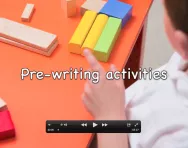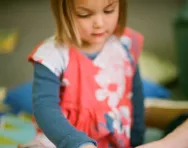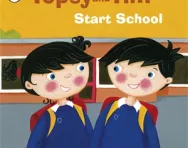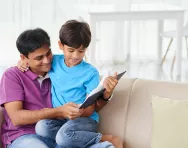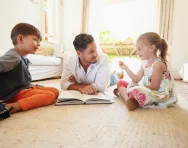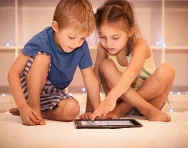Important update from TheSchoolRun
For the past 13 years, TheSchoolRun has been run by a small team of mums working from home, dedicated to providing quality educational resources to primary school parents. Unfortunately, rising supplier costs and falling revenue have made it impossible for us to continue operating, and we’ve had to make the difficult decision to close. The good news: We’ve arranged for another educational provider to take over many of our resources. These will be hosted on a new portal, where the content will be updated and expanded to support your child’s learning.
What this means for subscribers:
- Your subscription is still active, and for now, you can keep using the website as normal — just log in with your usual details to access all our articles and resources*.
- In a few months, all resources will move to the new portal. You’ll continue to have access there until your subscription ends. We’ll send you full details nearer the time.
- As a thank you for your support, we’ll also be sending you 16 primary school eBooks (worth £108.84) to download and keep.
A few changes to be aware of:
- The Learning Journey weekly email has ended, but your child’s plan will still be updated on your dashboard each Monday. Just log in to see the recommended worksheets.
- The 11+ weekly emails have now ended. We sent you all the remaining emails in the series at the end of March — please check your inbox (and spam folder) if you haven’t seen them. You can also follow the full programme here: 11+ Learning Journey.
If you have any questions, please contact us at [email protected]. Thank you for being part of our journey it’s been a privilege to support your family’s learning.
*If you need to reset your password, it will still work as usual. Please check your spam folder if the reset email doesn’t appear in your inbox.
What your child learns in Nursery: English and literacy
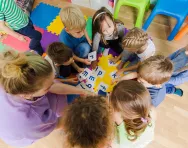
In your child’s Nursery year, they will start building the foundations for learning that they’ll need in Reception and onwards.
One of the ‘prime areas’ of learning in the Early Years Foundation Stage (EYFS, which includes Nursery) is communication and language. Within this are the literacy goals that children work towards.
The Early Years Foundation Stage Framework (essentially the curriculum for pre-school, Nursery and Reception children) sets out Early Learning Goals (ELGs), each of which has an ‘expected level of development.’
It’s important to keep in mind, though, that children at this stage vary hugely in their development and readiness to learn. If you have any concerns, talk to your child’s teacher or keyworker, but big differences at this point often even out in the EYFS.
Early Learning Goal: listening, attention and understanding
Your child will be encouraged to:
- Listen attentively and respond to what they hear during group or class discussions, and when being read to – for example, joining in with actions and songs.
- Make comments about what they’ve heard and ask questions to clarify their understanding.
- Hold back-and-forth conversations with other children and adults.
Try this:
- Read aloud every day – even if only for 10 minutes – and talk about the book. Look at picture books and ask your child to describe what is happening, ask them to point out objects, colours or shapes on the page, and use different voices and actions to bring reading to life.
- Make efforts to answer your child’s questions, even if they seem relentless! If they ask tricky questions (‘Why is the sky blue?’) try not to brush them off, but find out the answer together.
- Talk as much as you can – around the dinner table, while they’re in the bath, in the car, at the shops, or walking to the park. Encourage them to participate in the conversation and take turns: you could ask, ‘Which park would you like to go to today? Why do you like that one?’ or, ‘Shall we have red or green apples? Can you help me find them?’
Early Learning Goal: speaking
Your child will be encouraged to:
- Participate in one-to-one, small group and class discussions, giving their own ideas and using new vocabulary – these new words might relate to, for example, weather, nature, shape, size, volume, texture and sound.
- Offer explanations of why things happen, using recently introduced vocabulary from stories, non-fiction, rhymes and poems. For instance, the teacher may read Jack and the Beanstalk; the children then plant seeds and observe their growth, and use the words they’ve acquired from the story to explain what’s happening.
- Express their ideas and feelings about their experiences using full sentences, including use of past, present and future tenses and making use of conjunctions, with role-modelling and support from their teacher. Common topics include talking about their family, their likes and dislikes, what they want to do in the future, and what they did on holiday/at the weekend.
Try this:
- Give your child opportunities to talk to different people: you, their siblings, grandparents, friends etc. This could be on the phone or online, as well as in person.
- Help to build on their vocabulary by reading a range of fiction, non-fiction, rhymes and poems. Ask them if they know what a word means, and if they don’t know, explain it and show them how they could use it: ‘Enormous means really, really big. What sort of animal do you think is enormous?’
- Use new vocabulary as you’re going about your everyday life, focusing on nouns (names of objects, people, and places) and adjectives (descriptive words). For example: ‘You ran really fast just then – you’re so speedy!’
- Ask their opinions on things: ‘Shall we go to the park or feed the ducks? Why would you prefer to do that?’
- Help them name their feelings so they can express themselves better. You could introduce new words for their emotions, for example, like ‘frustrated,’ ‘disappointed,’ ‘nervous,’ ‘cheerful.’
Early Learning Goal: comprehension
Your child will be encouraged to:
- Demonstrate understanding of what has been read to them by retelling stories using their own ideas and vocabulary. For example, the teacher may read the class a story; the children are then encouraged to draw a picture based on the story (e.g. the wolf blowing down the little pigs’ house) and explain in their own words what is happening.
- Anticipate what might happen next in a story.
- Use and understand recently introduced vocabulary during discussions about stories, non-fiction, rhymes and poems and during role-play.
Try this:
- Read your child a story and then see if they can repeat what happened in their own words, or act it out – for example, you could ask, ‘Do you remember what happens next?’ or say, ‘Shall we pretend to be the wolf blowing down the house made of bricks?’
- Read a new book and try to guess what will happen on the next page/at the end of the story. You can join in with this; making a silly or improbable suggestion might prompt your child to make their own guesses – funny or sensible.
- Play a role-play game based on a theme from a book you’ve read or a TV programme your child has watched, such as playing schools or hospitals, praising them when they use a new word like ‘till’ or ‘stethoscope.’
Early Learning Goal: word reading
Any reading that your child does in Nursery will be under their own steam, acknowledging that they are at a very early stage of development. However, if your child is showing an interest, they MAY be encouraged to learn and say a sound for each letter in the alphabet.
The first letters children focus on are s, a, i, t, p, and n.
Try this:
- Make sure you familiarise yourself with how phonics will be taught in Reception, particularly with how letter sounds are pronounced: the phonetic sound for M, for instance, is ‘mmmm’ not ‘muh.’ Some phonics schemes have an action for each letter – you could ask your child’s teacher or keyworker what scheme they use at school and learn these actions.
- Look at alphabet picture books or rhyming books with your child and see if they can point to a particular letter. Focus on lower case letters.
- Talk about the letters you see when out and about, such as on road signs and in shop windows.
Early Learning Goal: writing
As with reading, there is little expectation or pressure on children to ‘learn to write’ in Nursery, but some will be keen to start what is known as emergent writing – making lines, shapes and symbols that begin to represent letters.
If your child shows an interest in writing, they will be encouraged to:
- Hold a pencil correctly in preparation for fluent writing, using the tripod grip.
- Explore mark-making with a range of pencils, pens, crayons and paint.
- Begin to show accuracy and care when drawing.
- Attempt to write recognisable letters, using the correct letter formation.
Try this:
- Familiarise yourself with the tripod grip and try to encourage your child to use it when they’re holding a pencil, pen or crayon.
- Give them opportunities to use different everyday objects that will improve dexterity in readiness for writing, e.g. blunt scissors, cutlery, zips and buttons.
- Find out from their teacher how handwriting is taught at school so you can follow the same method – some schools teach children to form individual letters first (printing), while others teach cursive (joined-up writing) from the start.
- If they are showing an interest in forming letters, rather than always giving them pencil and paper, let them experiment with forming them in different mediums such as sand, shaving foam on a tray, play dough or finger paints.
- Encourage them to verbally label and describe their drawings – ‘I love this painting! Can you tell me all about it?’
